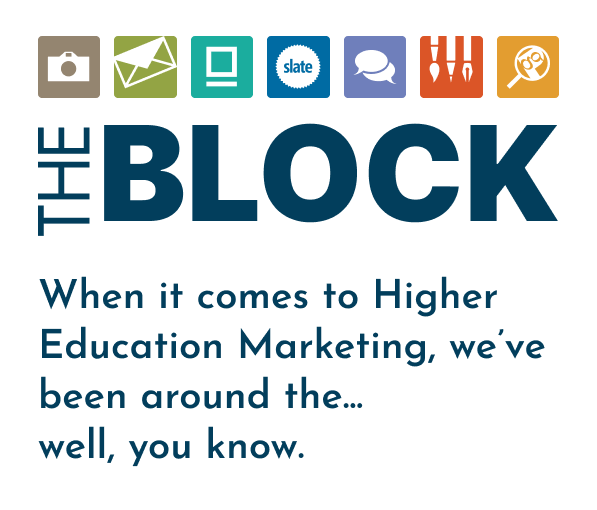
Think of your LinkedIn feed. How many times a week do you see a new admissions position open or someone in enrollment announcing their departure?
Chances are … you see this a lot.
The high turnover rate in admissions is not unlike what we’re seeing happen throughout the country, regardless of industry. But specifically in enrollment, from lower to higher level jobs, employees are jumping ship either to other institutions or to leave the industry altogether.
The Career Span of College and University Admissions Officers
The average employment of an admission counselor is 2.5 years at their institution. If you’ve made it to 5 years, you’re considered a lifer.
While this might give them a raise and more responsibilities, overall there isn’t really a defined career path in college university admission. Considering a majority of admissions counselors are at the start of their career, the lack of a direct path is inconsistent with what these people seek, leading many to leave.
What else can explain this?
To begin, admissions officers average a pretty low salary. Indeed.com reported admissions counselors in our home state of North Carolina make on average $44k. The national average is $45k. Coupled with the amount of traveling they must do (around 6 weeks out of the year), the role certainly contributes wear and tear on the employee.
If a counselor is at a smaller liberal arts college, he or she has to work harder to market the institution than a counselor working for a school with a household name. Counselors working at a big school get to spend a majority of their time reading volumes of applications from students already familiar with their college. The need to get one’s name out there isn’t as dire for a big state school or an Ivy League.
In an admissions team, there consistently needs to be a succession plan because someone always seems to have one foot out the door.
Where Do Admission Professionals Go?
This depends. At a big institution, you might stay there and move up internally. If you have a small to mid level position at a large school, you might move to a smaller school to take a higher level position.
On the flip side, many in higher ed find themselves stagnating in their role or mobility. This leads people to make the jump to corporate, say a higher ed marketing firm such as The Parish Group.
Going corporate often has bigger pay scales that mirror the employee’s understanding of their value and worth.
At many public institutions, that budget for fair pay just isn’t there. But is it not more cost-effective to invest in your current staff than to be constantly onboarding new employees? Let’s get into this.
What Enrollment Specialists Are Saying and The Parish Group’s Tips to Slow the Rotating Door
There are tactics we can use to ensure staff are happy, thriving, and more likely to stay with their university long-term.
We talked to our friends and colleagues in higher ed admissions about this turnover crisis. Specifically, we asked them what solutions could decrease this phenomenon.
1. Better Compensation & Flexible Schedules
“Additional compensation across the board and [recognizing] folks with additional days off outside of the normal holiday schedule,” says one Dean of Enrollment when asked about potential solutions.
With the cost of living rapidly increasing and inflation adding extra pressure, raising wages can help alleviate stress and actively show the employee that they are valued by their institution.
“Travel season versus reading season versus yield season is one example of enrollment funnel activity that can be tricky to navigate with staff, however enrollment managers need to realize that flexibility is key in retaining employees,” says one VP of Undergraduate Admissions.
Rest days are not just for working out! It’s important to understand the benefits of days off on overall productivity and happiness.
2. Personal and Professional Development
Jason Fletcher, the Director of Admissions at Houston Baptist University, says the solution starts with investing in the employee’s growth.
“Provide clear levels for advancement as this career is not a stopping point, but a path towards real change. Increased compensation to match the current day level of expectation for each role and professional development that is meaningful. Lastly, a good old fashioned thank you [goes a long way],” says Fletcher.
Championing the value of your admissions staff should feed into overall strategic university goals.
After all, the admissions counselors are essential. They are the ones actively on the ground recruiting students. If they are unable to perform their job, there will be no students, making the delegation and policy decisions done by higher level admissions officers moot.
As our Senior Account Executive Roger Jones puts it, “The ability to be in enrollment and admissions is the ability to touch a life. And it’s not always the life of a prospective student. It can be the staff.” Jones has run multiple admissions offices throughout his career, spanning Christian schools to HBCUs, as well as worked in higher ed marketing.
By actively investing in the personal and professional development of your staff, you are sending a clear message to them that they are not as highly replaceable as the industry makes them out to be.
3. Option to Operate Remotely
If the past two years have taught us anything, it’s that working remotely is more functional and productive than we ever could have imagined.
“We in higher ed need to recognize that a hybrid working model is possible for enrollment management professionals. No longer can we say you must be in the office to be effective,” says one enrollment manager.
Offering remote work or being flexible with employees when they request to WFH is another great option that further establishes their importance within the team. It shows you are actively listening to and considering the wellbeing of your staff.
“Many other industries have learned this lesson,” says Robert Andrews, the Assistant Vice President of Operations and Student Services at Duquesne University. “We need to learn from the past two years that productivity has been redefined. We have and will continue to review which work functions can be performed outside of the traditional work environment. The value proposition that much of higher ed operates under is the in-person student services we provide on our campuses remains just as vital in support of our students, their families, and our colleagues. However, identifying which work can be completed remotely is an important first-step for all institutions to evaluate. Holding onto the old measures will run people out of this industry or keep them from joining it altogether.”
In recent years, private institutions like Duquesne have found their greatest concentration of prospective students far away from the campus itself. Now, more kids go online to do their research rather than physically stop by the school.
“We’re on the precipice of a situation where we need to understand the true value of enrollment,” says Andrews. “If we choose to go back to business as usual, we are forgoing progress in our industry.”
Contact The Parish Group for Consulting & Training Services
Every college and university is different and we do have to be respectful of the resources available. Some places do not have the same tools to succeed as other institutions.
But when it comes down to it, showing appreciation to your admissions team by investing in their growth and happiness will contribute to overall functionality.
The Parish Group offers admission staff training as a part of our consulting services. If you’d like to learn more about the benefit of professional development within your team, reach out to us at success@parishgroup.com or call our office at 828-505-3000.









